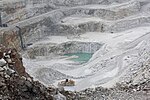 | Lime (material) (section Roman concrete) The Romans used two types of lime mortar to make Roman concrete, which allowed them to revolutionize architecture, sometimes called the Concrete revolution... 19 KB (2,359 words) - 19:57, 24 March 2024 |
 | making regular Roman concrete, brick dust can also be used. Besides regular Roman concrete, the Romans also invented hydraulic concrete, which they made... 47 KB (5,816 words) - 02:54, 19 March 2024 |
 | strength of concrete was improved by the reinforcing. Before the 1870s, the use of concrete construction, though dating back to the Roman Empire, and... 61 KB (7,109 words) - 01:19, 10 April 2024 |
 | Dam (redirect from Concrete-face rock-fill dam) structures still in use. Roman engineers built dams with advanced techniques and materials, such as hydraulic mortar and Roman concrete, which allowed for larger... 92 KB (11,050 words) - 15:07, 1 February 2024 |
 | Tobermorite (section Use in Roman concrete) ingredient responsible for the longevity of ancient undersea Roman concrete. The volcanic ash that Romans used for construction of sea walls contained phillipsite... 11 KB (940 words) - 20:56, 18 January 2024 |
 | Self-healing concrete is characterized as the capability of concrete to fix its cracks on its own autogenously or autonomously. It not only seals the... 34 KB (3,991 words) - 22:29, 12 April 2024 |




